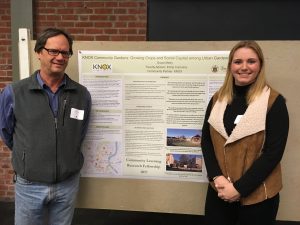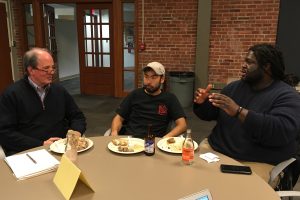Learning Together: Trinity Research Fellows, Faculty, and Community Partners
Photo: “Small Business and Community Development along New Britain Avenue” project with Southwest and Behind The Rocks Neighborhood Revitalization Zone. From left to right: Susan Pleasant, Professor Janet Bauer, Larisa Bogomolov ‘20, Debra St. Germain, and Jim Boucher
Trinity’s Community Learning Research Fellows program hosted its seventh annual research presentation on Monday December 11th, 2017. Led by Professor Carol Clark, associate professor of economics, the Research Fellows program sponsors a weekly colloquium for students and faculty to develop community-based research projects in consultation with Hartford partner organizations. At this year’s well-attended event, Trinity students and Hartford community partners reflected on what they gained from learning together.
Trinity sophomore Larisa Bogomolov teamed up with the Southwest and Behind the Rocks Neighborhood Revitalization Zone (NRZ) to design a study of small businesses and community development along New Britain Avenue. Professors Janet Bauer and Carol Clark helped her connect with the NRZ leadership and conduct her research project. Larisa interviewed both business owners and NRZ members to compare the different types of concerns raised by each group, identifying ideas for further cooperation. “I have a better connection with the community around my college,” Larisa reflected, “and I thank the NRZ for inviting me into the organization and showing me what it takes to spark revitalization.”
NRZ members praised Larisa’s dedication to community-based research and look forward to continued collaboration with Trinity. Debra St. Germain described how she was “blown away by the amount and detailed level of information” that the study provided and noted that business owners talked more openly with Larisa than they did with her. NRZ co-chair Jim Boucher also spoke about Larisa’s “initiative and her disciplined process to gathering information and reporting back to us.” Research partners are essential because neighborhood organizations rely entirely on volunteer labor. Boucher also asked for Trinity to assist the NRZ in locating previous studies conducted on the neighborhood in order “to make good decisions” in the future.

Trinity senior Grace Metry’s partnership with KNOX, a non-profit organization that sponsors neighborhood gardens, also demonstrated the two-way benefits of community-based research. Grace arranged an independent study with Professor Emily Cummins in the Urban Studies Program, and using her Spanish language skills, she conducted interviews to better understand how social networks develop in these programs. Her research asked: Is KNOX utilizing its gardens in the most effective way to increase the social capital of Hartford gardeners and neighborhoods? Ron Pitz, executive director of KNOX, described what he learned from collaborating with Grace: “She pointed out that while people go to the gardens to produce food, there’s also a social aspect, and KNOX needs to be the catalyst. That’s why we’re continually building structures like picnic tables and pavilions for the gardeners to gather together, and we need to work on that a bit more.” In turn, Grace learned far more than she expected about non-profit organizations: “I was surprised by the extensive network of KNOX programs, with many moving parts, and how they are constantly trying to improve community development as well as Hartford’s greenspace.”
This fall event included additional Research Fellow presentations. Kenneth Haas, IDP, and a team of econometrics students presented their analysis of financial institution mortgages in metropolitan Hartford (with Professors Diane Zannoni and Carol Clark, in partnership with the Hartford Community Loan Fund). Also, Henry Chavez ‘18 shared his study of perspectives on the Hartford Consortium for Higher Education (with Professor Isaac Kamola, and HCHE as the community partner). Many of these projects will continue into the Spring and beyond, given the positive experiences and results from these collaborations. Additionally, four other Research Fellows–Chelsea Armistead ’18, Daisuke Katsumata ’18, Adelaide Jenkins ’18, and Jillian Ramsay ’18–will present their year-long research projects in the Spring semester.

Professor Carol Clark redesigned this year’s Research Fellows program to enrich the community-based research process. In addition to scheduling new Friday lunchtime class meetings, she also created the role of a Community Consultant to participate in discussions each week. This year’s consultant James Jeter, a neighborhood resident and analyst at the Hartford Community Loan Fund, made valuable contributions to the learning process. “Students began the semester with very broad research questions, but James always looped it back by asking, ‘What are your community partners going to get out this research?’” explained Michelle Treglia ‘18, a teaching assistant to Professor Clark. In addition, Jeter reflected on how participating in the weekly classes broadened his own education. “If given the opportunity to interact with the Hartford community, Trinity students are extremely proactive and ambitious,” he observed, “and they take critique very well.”
The Community Learning Initiative will announce a new Research Fellows application process for Trinity students, faculty, and partner organizations, with a deadline in March 2018. To be eligible to apply, students must submit a credit-bearing research proposal as part of a course, internship, independent study, or senior thesis in 2018-19. Fellows earn an additional 0.5 credits for participating in the Research Fellows colloquium and receive a small grant for research expenses. To learn more, contact CLI Faculty Director Jack Dougherty or Associate Director Megan Hartline


